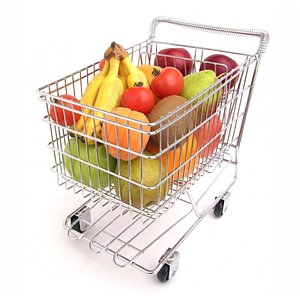Farmers Markets can come in all shapes and sizes, from a small co-op gathering in a parking lot to a complex covering large acreage. We’ll examine some common characteristics of Farmers Markets, and the benefits of shopping at them.
According to Wikipedia, a Farmers Market is : ” usually held outdoors, in public spaces, where farmers can sell produce to the public. Whereas these markets were commonplace before the Industrial age, they were often replaced in modernized cities with grocery stores that sell food that is usually pre-packaged and shipped from long distances. With the start of the modern environmental movement in the 1970’s farmer’s markets, even in inner-city environments, became economically sustainable with renewed interest in locally-grown, chemical-free and organic produce. Markets can range from a few stalls to many city blocks. In some cultures, live animals, imported delicacies unavailable locally, and personal goods are also sold.”
Ideally, a local Farmers Market features fresh, locally grown, organic, highly nutritious, delicious food harvested at its peak of flavor, ripeness, and nutrition. By providing small, local farmers a viable outlet to sell their products direct to the consumer, a Farmers Market is instrumental in helping to sustain the viability and way of life of the small, non-production farmer. Locally-grown produce also dramatically reduces the cost of shipping and the consumption of fossil fuels.
Because the wholesale price of commodity produce is so low–barely above production costs–it heavily tilts the playing field in favor of huge agricultural operations that compete on economy of scale, very often using huge amounts of toxic chemicals, genetically-modified seed strains, and harvesting before the produce is ripe so it will ship better and last longer. If the wholesale price is only pennies a pound over production costs, then only the commercial operations pumping out millions of pounds are economically feasible, as pennies multiplied by millions is a lot of money, but only multiplied by a few thousand isn’t enough to sustain a small-farming family. Eliminating the wholesaler middle man allows these farmers to realize a larger profit on their products, while very often saving the end consumer money as well.
Generally, more than just produce is available at a Farmers Market. Locally grown poultry, beef, pork, dairy, honey, and eggs are just a few examples. If one is fortunate enough to be near the ocean, fresh shrimp, crabs, fish, etc may also be available. And many times, heritage heirloom strains of these products are grown locally by specialty farmers that would never be seen at a large grocery chain. Many markets also feature delicious, home-made foods prepared by local farmers and businesses, including breads, cheeses, jams, jellies, and other delicious treats. Some markets even offer plants and seeds so that the consumer may grow their own edibles or ornamentals.
Consumers must always exercise caution, even when shopping at Farmers Markets if they truly want to support only local organic farmers. Some markets allow vendors to sell food that has been commercially produced and shipped in from long distances. And there is often fraud, where vendors resell commercial produce mislabeled as local and organic. Some, such as the South Carolina State Farmers Market, even contain large wholesale vendors, acting as a hub to distribute produce throughout the country.
One of the biggest benefits of shopping at a Farmers Market is that the consumer can literally talk to the person who grew the food they are purchasing. Not only does this give the consumer a great advantage to determine exactly who and where their food came from, it also gives them the power to provide feedback to the farmer and ask for certain types of food to be provided. Many times, the farmer will be willing to grow certain crops if there is enough local market demand. And it promotes a strong sense of community, allowing neighbors to interact and get to know one another, allowing non-farmers to learn and understand more about how food is grown and the people who work so hard to provide it for them. This is especially invaluable in an inner-city environment, where most children are not exposed to an agrarian way of life.
And for the tourist, a local market is a wonderful, invaluable way to really experience the local flavor and culture. Markets are traditionally used worldwide as a means of distribution, and the traveler can often find highly unique treasures there that would never be available in a larger chain store.
When you visit a Farmers Market, make it a goal to experiment with at least one type of food you are unfamiliar with, or rarely eat. You will often find that ripe, organic, locally grown food harvested at its peak of flavor is a far cry from the bland tasteless foods at a large chain store. You may find that the ‘real’ version of a vegetable you thought you hated is really delicious! Take the time as you stroll through to really immerse yourself in the environment, especially the fragrance of the ripe fruits and vegetables. Think about it, how much do you ‘smell’ the food in the grocery store? In a Farmers Market, the scent of fresh tomatoes, cantaloupes, berries, apples, etc. etc. permeates the air and delights the senses.
Comments
Powered by Facebook Comments



Connect with Us on These Sites